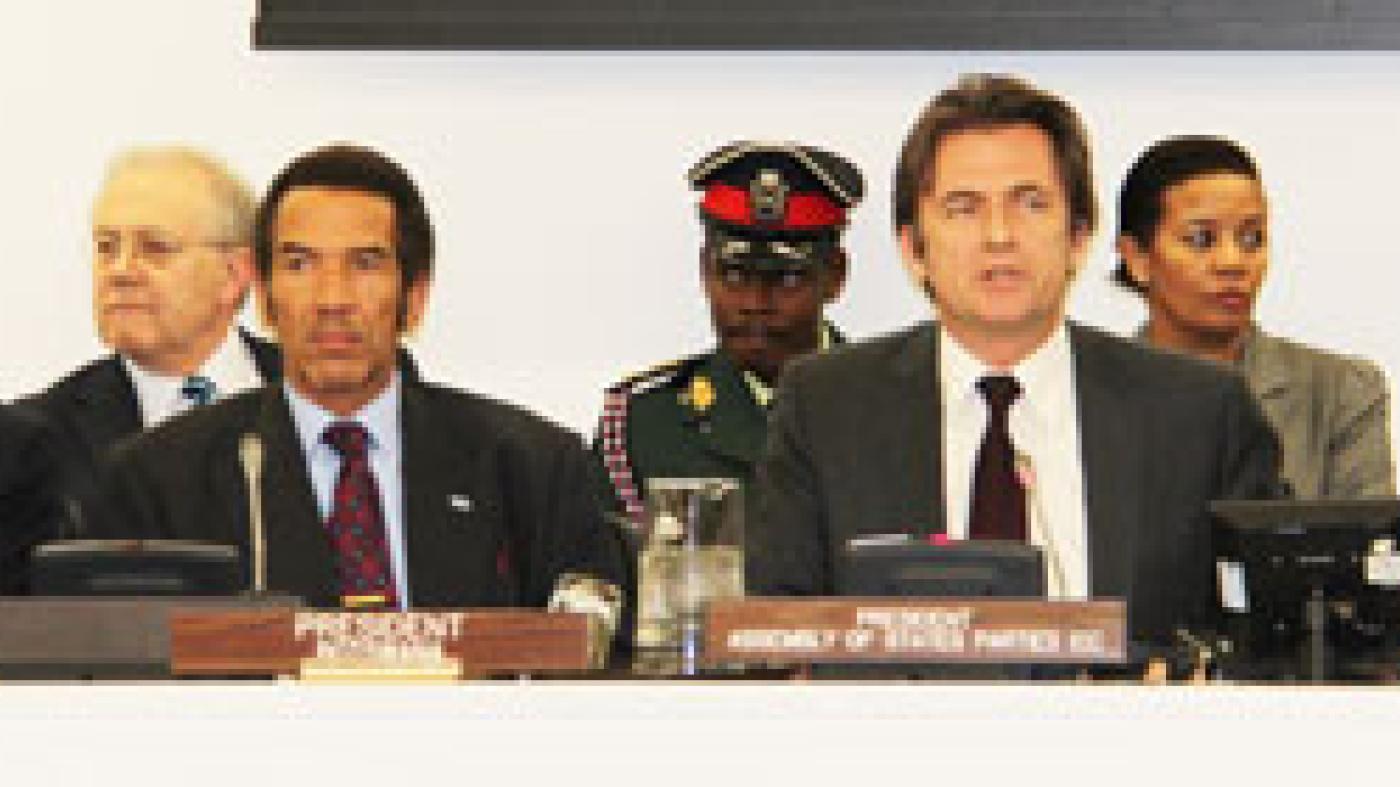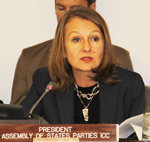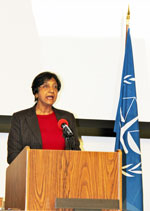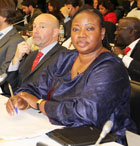
The Assembly of States Parties to the Rome Statute of the International Criminal Court (“the Assembly”) opened its tenth session at UN Headquarters in New York, which will last from 12 to 21 December 2011.
The outgoing President of the Assembly, Ambassador Christian Wenaweser (Liechtenstein), underscored some of the achievements of last three years, including the increase in the number of States Parties to 120 and the Kampala Review Conference, but also the challenges lying ahead, especially how to make best use of the Rome Statute system.
 The Assembly elected Ambassador Tiina Intelmann (Estonia) as President for the tenth to twelfth sessions. It also elected for the same period Ambassadors Ken Kanda (Ghana) and Markus Börlin (Switzerland) as Vice-Presidents and the following other members of the Bureau: Argentina, Belgium, Brazil, Canada, Chile, Czech Republic, Gabon, Finland, Hungary, Japan, Nigeria, Portugal, the Republic of Korea, Samoa, Slovakia, South Africa, Trinidad and Tobago and Uganda.
The Assembly elected Ambassador Tiina Intelmann (Estonia) as President for the tenth to twelfth sessions. It also elected for the same period Ambassadors Ken Kanda (Ghana) and Markus Börlin (Switzerland) as Vice-Presidents and the following other members of the Bureau: Argentina, Belgium, Brazil, Canada, Chile, Czech Republic, Gabon, Finland, Hungary, Japan, Nigeria, Portugal, the Republic of Korea, Samoa, Slovakia, South Africa, Trinidad and Tobago and Uganda.
Upon her election, President Intelmann observed that, in the coming years, the Assembly would need to focus on how best to assist the Court in handling its increasing workload, providing it with adequate means and ensuring broad political support. She further reminded States of their important responsibilities under the Rome Statute system, including prosecution of relevant crimes in national courts.
In an opening statement, the United Nations Deputy Secretary-General, Ms. Asha-Rose Migiro, highlighted the progress achieved in the course of the last year towards putting an end to impunity for international crimes. She reaffirmed that the partnership between the United Nations and the Court was based on shared values as well as mutual respect for the respective mandates of these institutions.
In a keynote address to the Assembly, the President of Botswana, H.E. Seretse Khama Ian Khama, gave a positive assessment of the work of the Court, which he characterized as an important player in the overall human quest for global peace and security of mankind. He pointed out that the effectiveness of the ICC depended on State cooperation and expressed regret in this regard over the African Union decision in June 2011 not to cooperate with the Court. He appealed to all States to support victims by promoting judicial and other efforts to end impunity and promoting accountability for serious international crimes.
 Opening remarks were also delivered by the United Nations High Commissioner for Human Rights, Ms. Navanethem Pillay, who observed that the ICC and human rights protection complemented each other. She called for a political consensus on objective criteria regarding Security Council referrals and deferrals. She further considered it within her remit to call upon the Council to refer a situation to the Court when it appeared to her that gross human rights violations amounting to international crimes have been - or are being - committed, as she had done regarding Syria.
Opening remarks were also delivered by the United Nations High Commissioner for Human Rights, Ms. Navanethem Pillay, who observed that the ICC and human rights protection complemented each other. She called for a political consensus on objective criteria regarding Security Council referrals and deferrals. She further considered it within her remit to call upon the Council to refer a situation to the Court when it appeared to her that gross human rights violations amounting to international crimes have been - or are being - committed, as she had done regarding Syria.
The President of the Court, Judge Sang-Hyun Song noted that 2011 had been the busiest year of the Court so far, with an increase in the number of country situations, Court hearings, new applications for victim participation as well as for reparations. He therefore called for an outcome of the budget discussions reflecting a rational balance between the task-driven needs of the Court and the requirements of economy and efficiency.
The outgoing Prosecutor, Mr. Luis Moreno-Ocampo, highlighted three key areas of his Office’s policy during his tenure, namely full respect for the principle of complementarity, focus on those who bear the greatest responsibility for the most serious crimes and contribution to the prevention of future crimes. He expressed the view that the two competing risks facing the Court, i.e. infringement on its independence and isolation, had both been managed.
The Chair of the Board of Directors of the Trust Fund for Victims, Ms. Elisabeth Rehn, referred to the various forms of assistance extended under the Fund to victims to date in spite of scarce resources. She also pointed to future prospects, including the challenges related to Court-ordered reparations. She expressed her gratitude to all donors and institutions supporting the Fund.
 The Assembly elected by acclamation Ms. Fatou Bensouda (Gambia) as the new Prosecutor of the Court for a period of nine years starting from 16 June 2012. Thanking States Parties for the honor bestowed on her, Ms. Bensouda pledged to continue working in close cooperation with the other organs of the Court under the “one Court principle” as well as with the Assembly and civil society and to ensure that the Office of the Prosecutor would carry out its work in a consistent, predictable and transparent manner.
The Assembly elected by acclamation Ms. Fatou Bensouda (Gambia) as the new Prosecutor of the Court for a period of nine years starting from 16 June 2012. Thanking States Parties for the honor bestowed on her, Ms. Bensouda pledged to continue working in close cooperation with the other organs of the Court under the “one Court principle” as well as with the Assembly and civil society and to ensure that the Office of the Prosecutor would carry out its work in a consistent, predictable and transparent manner.
For additional information please contact
Ms. Estera Luteranova at +1 646 591 8218 or via email at [email protected].